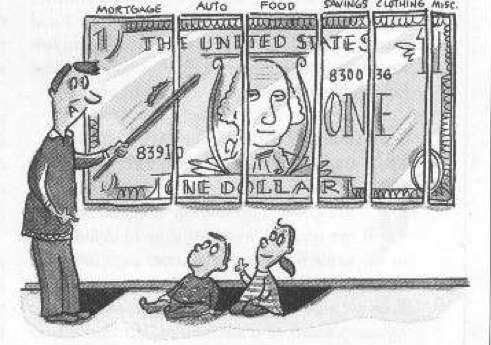

With the holidays upon us and our country still facing a challenging economic crisis, many families are struggling with how to balance celebrating and spending without disappointing their children.
From news stories to Facebook postings, families are expressing clear concern for how to celebrate this year, what to buy for their kids and how much money to spend. They want to be honest with their kids yet shelter them from their adult financial concerns at the same time. Moreover, they feel guilty because this year was supposed to be different because last year they had the same stresses and concerns.
That’s the bottom line for everyone. Last year we all hoped that this year would be different. We hoped that last year’s tough economic downturn woud be much improved by this year. We all painfully know that reality didn’t quite occur as we hoped and we are all once again struggling with how to celebrate with funds not being where we hoped - and what to say to our kids.
Last year I posted about these issues based on a Boston Globe article by Barbara Meltz. To help you talk with your kids and regroup together, I decided to repost that article for you today. Here it is:
*****************************************************************
As with most tough issues in life, honesty is always your best policy with kids, kid-appropriate, of course. Kids have an amazingly fine-tuned radar for knowing when a parent is worried. More than that, they are very good in picking up on gigantic world issues from their friends and worrying themselves about their own world.
Barbara Meltz, Boston Globe columnist, agrees. In her article, Helping kids understand family finances, she discusses not only how kids react to tough societal stresses, but ways parents can not only discuss these tough issues and be on the look out for signs that kids are having trouble coping with the enormity of situation.
The article opens with the story of a family that could be any of us - a basic nuclear family trying to plan for the future but is otherwise financial ok at the moment. For this family, they focused their conversation on “saving money by not wasting”. In the father’s words:
“‘Countries have financial ups and downs. This is a down time. Our family is not in trouble, but as a precaution, we are rearranging our budget. You guys can help.’”
Their kids help with reminding the family to turn off lights and the TV. Those small actions can add up for all of us over time!
We take the same tact with our kids and are learning that their middle school is actively teaching the girls about the environment and saving in school. “Go green” has been our families motto for a while but at the moment has taken on an interesting financial twist at the economy continues to sour.
By the way, keep in mind that that kids’ reactions to tough times are independent of their families tax bracket and that isn’t something parents always understand. So if you are one of the lucky families who won’t have to worry about this financial crisis, your kids are still worried, or at least worried for their friends.
Meltz and I have always shared a vision of being proactive about parenting and needing to balance information with reassurance. Her current article hits the nail on the head with not only the tone of the conversations we need to have with our kids right now but ways we can step in when we sense trouble.
The printed Boston Globe article contains a small chart with a trouble-shooting guide to help you intervene if your child is showing signs of stress. Here are the highlights to be on the lookout for:
- Changes in behavior. Meltz suggests initiating an age appropriate discussion and try and get your child talking about what he or she has heard at school.
- Your child starts to discuss friends going through tough economic times. Hit the nail on the head by reassuring your child about your families situation.
- You started a discussion and now your child seems very unhappy.Be reassuring and help your child see that your family’s situation stable despite any modifications that have to be made due to the economy.
- Nothing you say seems to “get through” (especially for a middle schooler). Meltz said it best “offer hope”. The age group needs to know the truth so don’t candy coat it but be careful not to make statements that place blame on the child inadvertently. This is the age of moodiness so this group will brood and stew while readjusting to a new reality.
- Holiday expectations are becoming unrealistic. This is one area you just have to be clear about. Kids always get carried away with their holiday lists but this is a year where most kids just won’t get a huge pile.
I find it helps kids to know that all their friends are going through the same exact thing. It also helps kids to give to other kids in need. I’ll be blogging more on this soon but kids love to give back and by finding ways to tap into that a bit, it will remove the focus from your own situation and help them develop a sense of community and altruism.
One thing is for sure, this is one situation that is touching everyone, although some much more deeply that others. We don’t know how long this will last so we have to be honest, realistic and help our kids understand there is more to being a family than the tangible things we have inside our houses…and that their world won’t end wearing last year’s clothes.
For more information on talking to kids about the economy, click here.
No comments:
Post a Comment